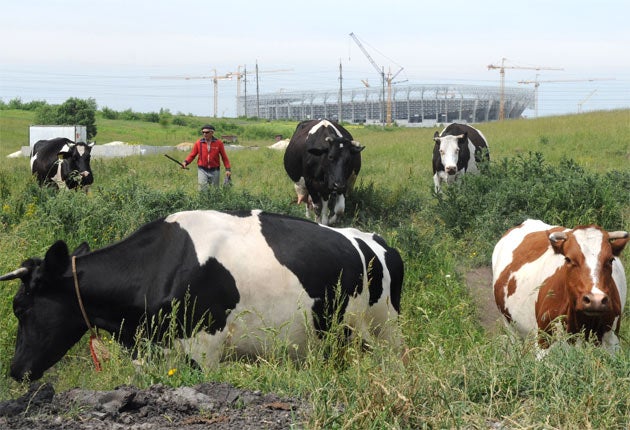We will be ready, Ukraine tells anxious Uefa
One year before hosting Euro 2012, Ukraine is keen to downplay problems with infrastructure and planning

Your support helps us to tell the story
From reproductive rights to climate change to Big Tech, The Independent is on the ground when the story is developing. Whether it's investigating the financials of Elon Musk's pro-Trump PAC or producing our latest documentary, 'The A Word', which shines a light on the American women fighting for reproductive rights, we know how important it is to parse out the facts from the messaging.
At such a critical moment in US history, we need reporters on the ground. Your donation allows us to keep sending journalists to speak to both sides of the story.
The Independent is trusted by Americans across the entire political spectrum. And unlike many other quality news outlets, we choose not to lock Americans out of our reporting and analysis with paywalls. We believe quality journalism should be available to everyone, paid for by those who can afford it.
Your support makes all the difference.It is not every day that the billionaire owner of a top-flight football club takes the official team bus to meet and greet a bunch of visiting hacks at the local airport – then waves them off again to a round of prolonged applause.
But then Alexander Yaroslavsky is no ordinary owner, with an infectious "one of the boys" attitude that belies a five-star lifestyle and an estimated £3.5bn fortune.
Today marks exactly one year before the Euro 2012 finals kick off in Poland and Ukraine. After months of concern about whether the two countries will be ready on time, Uefa and the local organisers are pulling out all the stops to crank up the publicity machine, conducting a whistlestop media tour to showcase the positive elements of the joint hosts.
Yaroslavsky, who owns Metalist Kharkiv, is typical of the kind of entrepreneur Ukraine is relying on to ensure the first major football tournament to be held in eastern Europe is a success. In his open-necked white shirt and jeans, he positively oozes pride and excitement both about the refurbished stadium that will host three group games next year and the local airport where a new runway and terminal are being built.
"A few years ago, nobody trusted Ukraine but the situation is changing," says Yaroslavsky who has pumped £265m of his own money into the local infrastructure. "We have made great progress. Look at Kharkiv, look at Metalist. One year ago this was empty land. Five years go, Metalist were in the second division, now we are ready to challenge the top clubs of Europe. I haven't had one minute of rest in four years."
The charismatic Yaroslavsky, who claims to have been a friend of Roman Abramovich for 20 years, is living proof of how the pace of change in Ukraine is quickening. Kharkiv, 40 miles from the Russian border, may be one of the lesser-known host cities but it will provide up to 2,000 hotel rooms and has set aside a fan zone – in a public park that hosted a Queen concert three years ago – for 45,000 fans.
Much has been made of the wisdom, or otherwise, of awarding Ukraine joint status with Poland. Even Uefa president Michael Platini has constantly urged the authorities to get a move on in terms of completing stadium and transport infrastructure on time. At one stage there was even talk, denied by Uefa, of stripping Ukraine of its joint status. But the message at last seems to be getting across. "Every month things have got a little bit better," says tournament director Martin Kallen.
Other cities visited so far include Lviv, near the Polish border, and the industrial city of Donetsk, home of 2009 Uefa Cup winners Shakhtar. Lviv, an undiscovered gem of architectural and cultural beauty, will also stage three group games and officials are keen to play down reports that the massive infrastructure needed will not be completed on time. Around 1,000 construction workers are operating on the stadium site round the clock, trying to make up for lost time. But take one look at the project, with swathes of building work still in need of attention, and you can see why there are considerable doubts whether the stadium will be ready for a proposed friendly against Austria in November, having already missed one key deadline.
"I admit the Lviv stadium is a challenge," says Kallen. "It may be the Austria game has to be switched to somewhere else but the stadium will definitely be ready by the finals."
The local mayor dismisses the threat of political unrest but last month a group of neo-Nazis interrupted a victory parade of war veterans, creating considerable provocation and sparking fears of revenge attacks by Russian fans next year.
And clearly, while most Ukrainians embrace the tournament, there is still a minority which doesn't. On a brief walking tour of the city, passive objectors held up placards protesting against having the finals in Lviv.
Arguably the biggest worry is the 70,000-capacity Olympic Stadium in Kiev which is due to stage the final. Despite costing $500m (£300m) – double the original estimate – it is way behind schedule, with 40 per cent of the revamped site still representing the original structure, and the pitch resembling a storage area.
Donetsk should have no such problems, at least not when it comes to infrastructure. Although Monday's attendance at the Ukraine-France friendly was pitifully low, the state-of-the-art stadium is hugely impressive. A flock of black swans has even been imported from Australia to glide along the adjacent lake.
Join our commenting forum
Join thought-provoking conversations, follow other Independent readers and see their replies
Comments